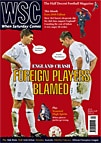 Robert Shaw reports on how Flamengo seek to change history and become 1987 Copa União champions, beating rivals São Paulo to five National Championships
Robert Shaw reports on how Flamengo seek to change history and become 1987 Copa União champions, beating rivals São Paulo to five National Championships
Two popular Brazilian clubs, Flamengo and São Paulo, are at loggerheads over a title. Not this year’s national championship, which São Paulo won with four games to spare, but the Copa União of 1987. Official champions that year were Sport from Recife, but Flamengo argue that the title should go to them. São Paulo were recently given a special trophy for being the first team to win five national championships – this year’s title adding to those of 1977, 1986, 1991 and 2006 – while Flamengo are still on four, years after the disputed season. The commemoration of São Paulo’s penta (fifth) by the Brazilian federation (CBF) prompted an exchange of letters, a media campaign and a plague of rival T‑shirts. One São Paulo fan spent the equivalent of £1 million extolling his team on billboards in the capital Brasilia, while Flamengo legend Zico complained: “Everyone knows that the CBF did not recognise Flamengo’s title due to political disputes.”
In 1987, a breakaway group of 13 clubs, frustrated by national disorganisation, decided to run their own championship, called the “Green Module”, while the CBF organised another competition, the “Yellow Module”. The CBF subsequently decided play-offs between the two Module winners would determine the national champions. But Flamengo, who beat Internacional in the Green final, refused to play yellow champions Sport. The CBF then declared Sport champions. The impasse, with an asterisk placed in the records denoting the two champions for 1987, has excited trivia buffs ever since.
In 1988, São Paulo were among the clubs who backed a letter recognising Flamengo as the legitimate champions of 1987. But this cut little ice with the CBF, FIFA or indeed Sport Recife, who maintain their single national title has an unimpeachable legal basis, given that in 1988 they also contested the Copa Libertadores.
Why wait 15 years to pursue this? Part of the answer may lie in noisy Paulista triumphalism. Flamengo have spent the interim developing a reputation for being Brazil’s worst-run club, with copious funds reportedly siphoned off by an assortment of directors and agents. Badly hit by the collapse of former sponsor ISL, Flamengo have been unable to access millions of pounds from their current backers, oil company Petrobras, due to their inability to pay off debts that automatically froze sponsorship payments. The penta é nosso (the fifth title is ours) campaign coincided with a remarkable resurgence in 2007, brought about by the return of talismanic coach Joel Santana. From no‑hopers stuck in the relegation area, Flamengo have now qualified for the 2008 Copa Libertadores. Although their tactics, based on two speedy wingers bombing forward, seem Neanderthal, crowds above 80,000 have created a caldeirão (cauldron) to upset even the best-organised opponents, with São Paulo and Santos losing in the Maracanã.
While Flamengo remain the country’s most popular club, São Paulo can claim to be the most successful, as celebrated on their fans’ “5-3-3” T-shirt – the numbers represent five national, three Libertadores and three world titles. But such assessments are complicated by the fact that the national title was only created in 1971. Before that, the best performers in the state championships of Rio and São Paulo had usually played one another in an annual tournament, whose winners were perceived to be unofficial national champions. But this was never conclusive because some of the best teams, notably Botafogo in the Fifties and Pelé’s Santos in the Sixties, paid more attention to lucrative foreign tours once the state leagues were over.
The Flamengo-São Paulo rift is one of many from Brazilian football’s past. Botafogo and Fluminense cannot decide which won the 1907 Carioca Championship; only in April did FIFA accept the 1951 Copa Rio success of Palmeiras made them de facto world champions. Part of the problem with revisionism is that formats have constantly changed, with many championships played more as knockout cups than leagues. Legal action is another complication, as the mountain of claims and counter-claims could just bring the game to a halt, not to mention incur the wrath of FIFA. But before the 2014 World Cup, it seems certain that Brazilian football authorities will be asked to tie up some loose ends reaching back a century.
From WSC 251 January 2008